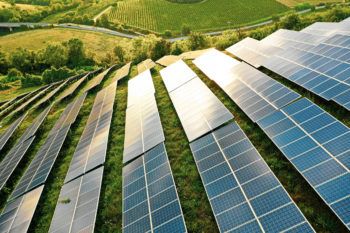The Potential, Benefits, and Drawbacks of Solar Energy
Solar energy, once a futuristic concept, has become a cornerstone of sustainable living. As we strive to reduce our environmental footprint, understanding the benefits and drawbacks of solar energy is crucial. Let’s delve into this powerful energy source that harnesses sunlight to create a cleaner and more sustainable future.
Advantages of Solar Energy
Cost Savings: A Brilliant Investment
One of the most appealing aspects of solar energy is the potential for significant cost savings. Homeowners and businesses alike can benefit from lower electricity bills, and the long-term return on investment often outweighs the initial installation costs. Governments worldwide offer tax incentives and rebates, making solar power an economically sound choice.

Renewable & Sustainable: A Green Revolution
Beyond the financial gains, solar energy stands out as a champion of sustainability. It’s a renewable resource, meaning it won’t deplete with use. Embracing solar power is a powerful step toward reducing our reliance on non-renewable energy sources, significantly decreasing our carbon footprint and mitigating climate change.
Drawbacks of Solar Energy
High Initial Costs: Breaking Down Barriers
While the benefits are numerous, the high initial costs associated with solar installations can be a barrier for many. However, it’s crucial to consider solar energy as a long-term investment. Over time, the savings on electricity bills and potential tax incentives often offset the initial expenses, making solar power an increasingly viable option.
Intermittency and Reliability: Chasing the Sun
A challenge faced by solar energy is its dependence on weather conditions. Cloudy days or nighttime render solar panels less effective. However, advancements in energy storage systems are addressing the intermittency issue, providing a more reliable and consistent energy supply.
Environmental Impact
Reduced Air Pollution: Clearing the Skies
Solar energy plays a pivotal role in reducing air pollution. By harnessing the sun’s power, we decrease our reliance on fossil fuels, cutting down harmful emissions. Cleaner air quality positively impacts public health and contributes to the fight against climate change.
Manufacturing and E-Waste: Addressing Concerns
However, concerns exist regarding the environmental impact of solar panel manufacturing and end-of-life disposal. Manufacturers are increasingly adopting sustainable practices, and research is ongoing to minimize the ecological footprint of solar technology.
Technological Advancements
Innovations in Solar Technology: The Bright Future
Technological breakthroughs are shaping the future of solar energy. Ongoing innovations are improving the efficiency and affordability of solar panels. From solar paint to flexible solar cells, these advancements are making solar energy more accessible and adaptable.
Government Policies and Incentives
Government Support: Powering Progress
Government policies significantly influence the adoption of solar energy. Incentives, subsidies, and favorable regulations encourage individuals and businesses to invest in solar installations. Staying informed about governmental support can guide individuals in making informed decisions.
Real-world Applications and Case Studies
Residential Solar Success Stories: Powering Homes Efficiently
Real-world examples showcase the success of solar installations in residential areas. Homeowners share their experiences of reduced energy bills, energy independence, and the satisfaction of contributing to a greener planet.
Commercial and Industrial Implementations: Shaping Economies
Businesses worldwide are embracing solar energy to power their operations. The economic and environmental benefits of solar integration are evident, contributing to a sustainable and eco-friendly business landscape.
Future Prospects and Trends
Grid Integration and Smart Technologies
The integration of solar energy into existing power grids is a promising avenue for addressing intermittency challenges. Smart technologies, such as advanced energy storage solutions and grid-tied systems, enhance the reliability of solar power, making it a more integral part of our energy landscape.
Community Solar Initiatives: Strength in Numbers
Community solar projects are gaining momentum, allowing individuals to share the benefits of solar installations. These initiatives promote inclusivity and provide access to clean energy for those who may face obstacles in installing solar panels on their properties.
Navigating Solar Financing
Financing Options: Making Solar Accessible
Navigating solar financing is crucial for widespread adoption. Exploring financing options, such as solar loans, leases, and power purchase agreements (PPAs), empowers individuals and businesses to embrace solar energy without hefty upfront costs.
Frequently Asked Questions (FAQs)
Q: Are solar panels efficient in all climates?
A: Solar panels can generate energy in various climates, but their efficiency may vary. They work well in sunny climates, but advancements in technology make them increasingly effective in less sunny regions.
Q: How long do solar panels last?
A: Most solar panels have a lifespan of 25 to 30 years. Regular maintenance and advancements in panel durability contribute to their longevity.
Q: What is net metering, and how does it work?
A: Net metering allows solar panel owners to sell excess energy back to the grid. The owner receives credits for the surplus energy, promoting a balanced and efficient use of solar power.
Q: Can I go off the grid with solar energy?
A: Yes, it’s possible to go off the grid with solar energy. Energy storage solutions, such as batteries, enable individuals to store excess energy for use during periods of low sunlight.
Q: Are there government incentives for solar installations?
A: Many governments offer incentives such as tax credits, rebates, and feed-in tariffs to encourage solar installations. These incentives vary by region.
Q: How do solar loans work, and are they a good option?
A: Solar loans provide financing for solar installations. They are a viable option for those who prefer to own their solar panels rather than leasing them.
Q: What is the environmental impact of solar panel manufacturing?
A: While solar panel manufacturing has an environmental impact, efforts are underway to reduce it. Sustainable practices and recycling initiatives aim to minimize the ecological footprint.
Q: Can solar panels be installed on all types of roofs?
A: Solar panels can be installed on various roof types, including asphalt, metal, tile, and flat roofs. The installation process may vary based on the roof’s material and structure.
Q: How do community solar projects benefit participants?
A: Community solar projects allow individuals to share the benefits of solar installations without installing panels on their properties. Participants typically receive credits on their electricity bills.
Q: What are the key factors to consider when choosing a solar installer?
A: When selecting a solar installer, consider their experience, certifications, customer reviews, and the warranties they offer. Researching multiple installers helps make an informed decision.
Conclusion:
In conclusion, the benefits of solar energy far outweigh its drawbacks, marking it as a key player in the transition to a sustainable future. Technological advancements, government support, and community-driven initiatives are steering us toward a world where solar power is not just an alternative but a primary source of clean and renewable energy.




